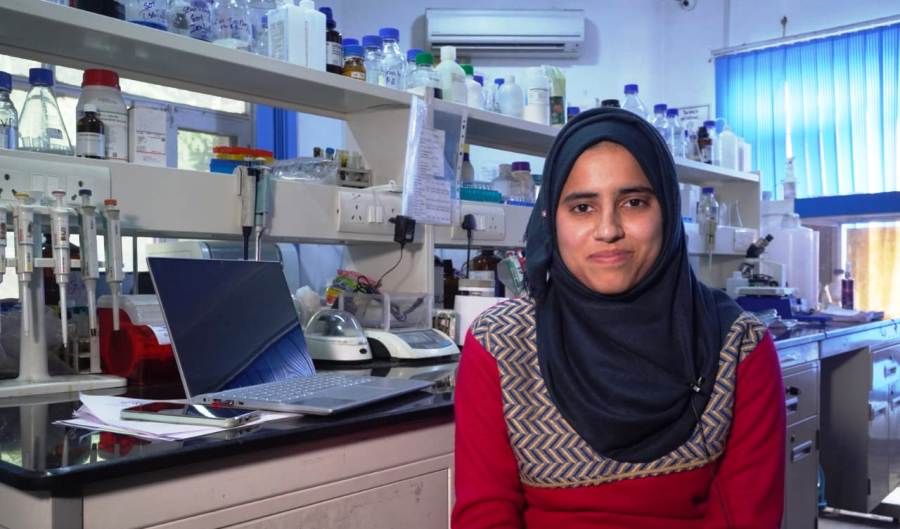Working in SKUAST-K’s potato laboratory, a scholar was desperate for the MS media, a key ingredient for tissue culture but the lab lacked funds. It took her 28 months to discover a cheap alternative that is abundantly around the campus and it fetched her a prestigious grant to set up a unit for its production, reports Ifra Reshi
Sameena Lone, the young Kashmir scholar, who bagged a Rs 50 lakh grant from the respected BIRAC for her ground-breaking innovation, intends to change the way people look at the mounds of weeds that are perennially extracted from Dal Lake. She will be converting the weeds into a cheap medium for popularizing tissue culture.
A resident of Nishat Brein, Sameena, the daughter of a forest range officer, is a vegetable science scholar currently pursuing her PhD at SKAUST. She earned her bachelor’s and master’s in horticulture from SKAUST and her work on potato tissue culture started during her MSc. Working with her mentor, Dr Khursheed Hussain at the Potato Tissue Culture Laboratory, she recognized the high cost of nutrient media used in the cultivation of tissue cell culture.
“During the learning process, once we fell short of the Murashige and Skoog (MS) media that we were using in potato tissue culture, I posted my mentor. He said the laboratory can’t buy media for lack of funds,” Lone said while recalling the first time she felt the necessity for looking at the alternatives. “My mentor told me he was also looking for alternatives as he faced the same problem at his own end.”
It pushed the team on a hunt for an affordable, organic nutrient medium that would allow farmers to conduct tissue culture on their own, generating disease-free plantlets with lower pesticide loads.
After 28 months, “in a whistle-blow phenomenon, Coontail media came to the limelight”. After three years of research and standardization, she discovered that part of the weeds in Dal Lake are hugely nutrient-rich and can be used to create ideas for tissue culture. The success led her team to patent the idea and the associated processes. The idea was found to enable potato farmers to have affordable, organic potato tissue culture media, which not only reduces costs but also produces healthier, and disease-free potatoes.
This became one of its kind and the first Organic Tissue Culture Media to be used for the mass multiplication of high-quality, disease-free, and organic planting material of potato. Its success led Sameena to set up her own start-up, Kashmeer Organo Greens Private Limited with her mentor as co-founder. The unit currently operates from SKUAST-K’s Innovation, Incubation and Entrepreneurship (SKIIE) Centre.
= Having an idea and floating a start-up does not make a successful enterprise because it requires resources. Sameena’s Eureka moment in 2018, however, lacked an environment in which capital and resources could be even discussed. There was no concept start-ups, the way it is mainstream right now.
Things started changing fast as the team started talking about the idea. Almost in every competition of newer ideas, Sameena’s MS media was taken seriously.
The idea won the first prize in an Innovative Idea Presentation Competition organized by Maharaja Ranjit Singh College of Professional Sciences, Indore (MP), on the 36th National Science Day in 2022.
Back home, the idea got selected for seed funding from the JK Department of Science and Technology and IC.
Again, the idea also won first prize in Innovation Business Competition during the National Innovation Workshop held at Jammu on December 1, 2022, organized by GCET Jammu in association with IIT Kharagpur and the World Consortium of University held at Jammu.
Then came the final surprise when the idea, Organic and Disease-Free Seed Potato Production through Tissue Culture in Kashmir, bagged a prestigious grant from the Biotechnology Industry Research Assistance Council (BIRAC), a Not-for-Profit Company’ of the Government of India, which supports technology innovators and entrepreneurs to pursue a promising technology and establish and validate proof of concept (POC) for the idea under the BIG grant scheme. It is a Rs 50 lakh grant.

The grant is a very competitive one. More than 500 innovators had applied for the grant and only 26 were selected for the final pitching round before the panel. Eventually, only nine innovators were selected. “I was the only one from Jammu and Kashmir to receive the BIRAC BIG grant in the present round,” Sameena said.
“This has helped me realise my dream of doing something creative and something that was not done before,” a confidant Lone said. “Still, a lot of work is to be done.”
The grant is a staggered process that will release funds coinciding with the completion of the project within two years. There are key milestones in the implementation of the project, which are linked with the release of funds. The next step for this project includes product development at a commercial scale, demonstration trials, marketing at cost, and conducting awareness campaigns to educate people about the benefits of organic and healthy vegetables.
The unit is starting with four employees and the numbers will go up as per the demand. Anticipated to require almost four tons of weeds a year, the project will fetch Kashmir a reliable tuber for growing organic and disease-free potatoes. Estimates suggest, Kashmir grows 4500 tons of potato a year but the consumption is much more. Sameena’s innovation can help growers use the MS media and pick the tissue culture skill for better production at home.
Sameena and her scholar colleagues along with their mentors are working on developing anti-diabetic carrots in the SKUAST-Ks plant biotechnology department.
from Kashmir Life https://ift.tt/Bt2vVUf
via IFTTThttps://kashmirlife.net
No comments:
Post a Comment